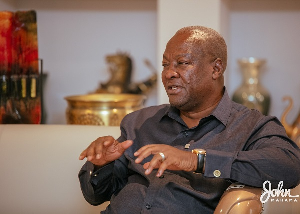 Ghana's President-Elect John Dramani Mahama
Ghana's President-Elect John Dramani Mahama
In the heated lead-up to the 2008 elections, Ghana's political landscape was rocked by allegations of corruption, with the New Patriotic Party (NPP) and then-President Kufuor accused of embezzling state resources. Despite the limited reach of new media then, the traditional press fueled these claims, driving a powerful narrative among disillusioned citizens and loyal party supporters alike.
The NPP, branded as “the seventeen thieves,” was on the defensive as the opposition National Democratic Congress (NDC) rode the wave of anger to victory in a hotly contested election. Upon assuming office, the new President issued his now-infamous “father for all” proclamation, signalling magnanimity and a desire for national unity. However, this spirit of inclusivity was swiftly undercut by troubling revelations.
During interviews for ministerial appointments, some nominees struggled to justify their rhetoric against NPP officials, raising suspicions of a hollow moral stance.
Curiously, throughout the NDC’s tenure in power, no one NPP official accused of looting the state faced credible prosecution. What explains this conspicuous “no show”? Was it an absence of evidence or the simple realisation that the fiery accusations were little more than campaign sensationalism? These questions lingered unanswered as Ghanaians watched, disillusioned and betrayed. Fast-forward to the Mahama administration, and the cycle repeated itself.
Scandals emerged—Abuga Pele became a rare scapegoat, convicted as a symbolic gesture of accountability. Yet, the remaining allegations faded into obscurity, reduced to footnotes in partisan histories. The machinery of corruption appeared immune, thriving amid political inertia and selective prosecutions.
The opposition NPP, eager to reclaim power, weaponized Mahama’s scandals as their political lifeline. They promised swift justice, portraying NDC officials as architects of economic ruin. Yet, upon assuming power, the NPP's performance in prosecuting corruption was woefully underwhelming. The highly publicised Ato Forson ambulance saga, a case propped up by “specific evidence,” failed to secure a conviction, sparking claims of political witch-hunting and fiscal recklessness. The result? Ghanaians witnessed the same script, just with a different cast.
One would have expected politicians to learn from history and abandon the well-worn strategy of using corruption prosecutions as electoral bait. Instead, we are again served the grand political spectacle—this time, the NDC’s “Operation Recover All Loots” (ORAL). This campaign, heralded as a crusade to reclaim Ghana’s plundered wealth, presents itself as the ultimate salvation for the nation’s economic woes. But is it? Herein lies our democratic tragedy: the collective failure of Ghanaians to interrogate political promises and hold leaders accountable beyond empty rhetoric.
Have we quickly forgotten that recovery must adhere to judicial processes, even if founded on truth? Have we not learned from history that allegations, no matter how loud or popular, can crumble in courtroom scrutiny, as seen in Ato Forson’s case?
It is deplorable that sections of the electorate cling to the fantasy that ORAL alone will inject unimaginable funds into Ghana’s economy—surpassing e-levy, COVID taxes, or any fiscal interventions. Such beliefs expose the alarming fragility of our democracy and the political naivety of our citizenry. How did we arrive at this place where election campaigns are reduced to grand illusions and Ghanaians are so easily swayed by promises that history repeatedly proves hollow?
Our political past is littered with evidence that should caution us. The pattern is as predictable as it is disheartening: accusations during campaigns, promises of recovery, and a post-election silence punctuated by selective prosecutions and eventual inaction. Yet, here we are again, swept up in the same currents of sensationalism, as though history’s lessons are lost on us.
If ORAL is Mahama’s defining agenda, then Ghana stands dangerously far from the prosperity we desperately seek—perhaps fifty years or more. The burden of leadership must be borne with honesty and a commitment to systemic change, not partisan gamesmanship. It is time for Ghanaians to reject the political theatre and demand accountable governance grounded in facts, not fiery speeches.
Our democracy is too precious, and our future too uncertain, to remain trapped in this empty promises and misplaced trust cycle. The time to learn is now—lest we continue to weep for our republic.